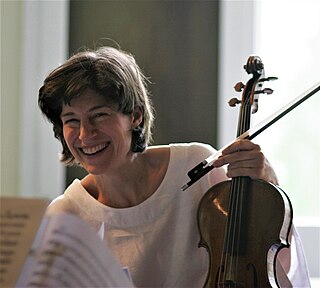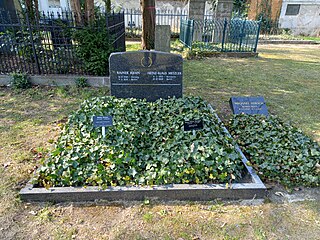Related Research Articles
Joël-François Durand is a French composer.

Kim Kashkashian is an American violist. She has spent her career in the U.S. and Europe and collaborated with many major contemporary composers. In 2013 she won a Grammy Award for Best Classical Instrumental Solo. She is recognized as one of the world's top violists.

Heinz-Klaus Metzger was a German music critic and theorist.

Tabea Zimmermann is a German violist.
Johannes Wolfgang Zender was a German conductor and composer. He was the chief conductor of several opera houses, and his compositions, many of them vocal music, have been performed at international festivals.

Lucia Ronchetti is an Italian composer.
Isabel Mundry is a German composer.
Carl Ueter was a German composer of classical music. From 1950 to his retirement in 1965 he was professor at the Hochschule für Musik Freiburg.
Janina Klassen is a German musicologist and professor at the Hochschule für Musik Freiburg.
Hans Heinrich Eggebrecht was a German musicologist and professor of historical musicology at the Albert-Ludwigs-Universität in Freiburg.
Susanne Fontaine is a German musicologist and university teacher.
Christoph von Blumröder is a German musicologist.
Joachim Brügge is a German musicologist and composer.
Emil Platen is a German musicologist and conductor.
Volker Straebel is a German musicologist and composer and performer of experimental music.
Wolfgang Marschner was a German violinist, teacher of violin, composer and conductor. He was concertmaster of the WDR Sinfonieorchester Köln, and instrumental in world premieres of contemporary music. He was professor at the Folkwang-Hochschule Essen, the Musikhochschule Köln, the Tokyo University of Fine Arts and Music and, for more than three decades, at the Hochschule für Musik Freiburg. He also taught at the Darmstädter Ferienkurse.
The Kairos Quartet is a Berlin-based string quartet founded in 1996.
Claudius von Wrochem is a German cellist.
Pauline Sachse is a German violist, chamber musician, and professor at the Musikhochschule Lübeck.
Hanning Schröder was a German composer and violist. From 1927, he worked in Berlin as a violist in orchestras for opera, radio and film, and in the Havemann String Quartet of his teacher Gustav Havemann. He formed the Harlan Trio with his wife and violinist Peter Harlan, performing Renaissance and Baroque music as pioneers of historical instruments. Due to his wife's Jewish descent, he had to stop working under the Nazi regime from 1935. They hid a Jewish couple in the house in Berlin that they left for safety reasons, earning them a Righteous Among the Nations recognition. As a composer, Schröder is known for chamber music, especially a string quartet based on the song of the Moorsoldaten from the Börgermoor concentration camp.
References
- ↑ "Dr. Simone Heilgendorff – Universität Salzburg" (in German). Retrieved 7 February 2021.
- ↑ "Simone Heilgendorff". ResearchGate . Retrieved 7 February 2021.
- ↑ Simone Heilgendorff, Kairos Quartet
- ↑ Simone Heilgendorff, Academia.edu
- ↑ Heilgendorff, Simone (2002). Experimentelle Inszenierung von Sprache und Musik : vergleichende Analysen zu Dieter Schnebel und John Cage. Freiburg im Breisgau: Rombach. OCLC 50207356.